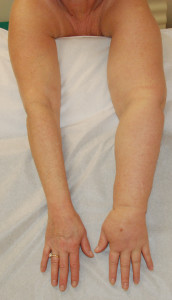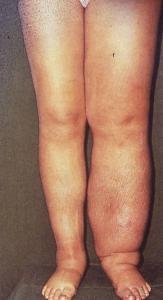Lymphedema of the arm
Learn How to Effectively Self-Manage Lymphedema
— Joachim Zuther, Lymphedema Specialist
GRANT-VALKARIA, FL, UNITED STATES, December 15, 2023 /EINPresswire.com/ — Chronic lymphedema is considered to be a progressive condition, regardless of its classification of either primary or secondary, and cannot simply be described as an accumulation of protein-rich fluid. It is a chronic, degenerative and inflammatory process affecting the soft tissues, skin, lymph vessels and nodes of the extremities, trunk, abdomen, head and neck, and exterior genitalia. Lymphedema can develop anytime during the course of a lifetime in primary cases, in secondary cases it may occur immediately following the surgical procedure or trauma, within a few months, a couple of years, or twenty years or more after treatment, and may result in severe and often disabling swelling.
It is well known and confirmed by research for quite some time that chronic lymphedema considerably impacts the health-related quality of life (QoL) and psychological well-being of patients around the globe affected by this disease.
It is therefore imperative that patients affected by Lymphedema know how to self-manage this condition.
The highest incidence of secondary lymphedema in the United States is observed following surgery and radiation for malignancies, particularly among those individuals affected by breast cancer, which is conceivably the reason why the majority of research on the impact of lymphedema on QoL was conducted on survivors of breast cancer with subsequent lymphedema (breast cancer related lymphedema/BCRL). The results of this research clearly indicate that health related QoL was significantly lower in breast cancer survivors with diagnosed lymphedema or with arm symptoms without diagnosed lymphedema, compared with survivors without lymphedema or arm symptoms.
As soon as, and sometimes before the swelling manifests itself, patients are confronted by esthetic problems (skin changes, increase in extremity size, ill-fitting clothing), functional problems (pain, stiffness, numbness, functional limitations, limitations in range of motion in the affected extremity, compromised normal activities of daily living and occupational responsibilities), psychological problems (negative self-identity, emotional disturbance, stress, negative impact on family life, social isolation, perceived reduced sexuality), as well as financial impact. When some patients realize that lymphedema is a chronic disease requiring life-long management, these problems may intensify, and patients feel that coping with the swelling is more demanding than the treatment of the disease that caused lymphedema in the first place.
In order to effectively combat not only the swelling, but also the negative impact of lymphedema on psychological well-being, early diagnosis, evaluation and coordinated multi-disciplinary treatment strategies by certified lymphedema therapists and qualified health care professionals are imperative. Just as important to effective lymphedema management is that patients have a general knowledge of the lymphatic system in order to understand the condition and how to treat and manage it effectively.
In the book “It’s Not Just a Swelling! – LYMPHEDEMA”, which is available as paperback, hardcover or e-book, Joachim Zuther provides an up-to-date and comprehensive guide for individuals affected by Lymphedema, their caregivers, and family members. Topics include: – Anatomy of the Lymphatic System – Causes of Primary and Secondary Lymphedema and their Stages – Complications of Lymphedema, such as Infections, Cellulitis, Leakage – Lymphedema Risk Reduction, Do’s and Don’ts for Lymphedema – Prevention of Lymphedema – Lymphedema and its Impact on Quality of Life – Treatment and Management of Lymphedema – Self-Management of Lymphedema (Self-MLD, Skin Care, Compression Therapy, Exercises) – Nutritional Aspects – Traveling with Lymphedema – and much more.
About The Author Joachim Zuther, world-renowned Lymphedema Specialist, Founder of the Academy of Lymphatic Studies, author of the bestselling textbook Lymphedema Management – A comprehensive Guide for Practitioners, and co-author of numerous chapters in textbooks for Lymphedema. Mr. Zuther is a member of the International Society of Lymphology (ISL), the National Lymphedema Network (NLN), and the German Association of Lymphology (DGL). He is also a founding member of the North American Lymphedema Education Association (NALEA).
The book is available on Amazon and Lulu
Joachim Ernst Zuther
Lymphedema Blog
+1 772-913-1027
email us here
Visit us on social media:
Facebook
LinkedIn
Instagram
YouTube
Joachim Zuther, Lymphedema Specialist, talks about the Incidence of Lymphedema
![]()
Originally published at https://www.einpresswire.com/article/674916782/lymphedema-and-its-impact-on-quality-of-life








